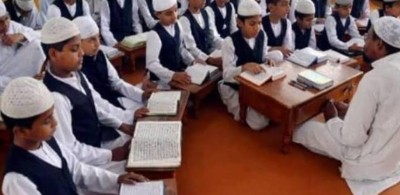Lucknow, March 4 : Jamiat Ulama-e-Hind (JuH), a leading organisation of Islamic scholars belonging to the Deobandi school of thought, has decided to take 2,000 madrasa students from Uttar Pradesh, Delhi and Maharashtra under its wings and provide them contemporary mainstream education.
This is an attempt to change the image of madrasas as obsolete, orthodox institutions into centres of holistic learning.
JuH secretary, Niaz Ahmed Farooqui, who is spearheading the pilot project, said, “Jamiat Open School’ will provide the infrastructure and trained staff to the students for studying computers, mathematics, sciences and language among other subjects offered under the National Institute of Open Schooling (NIOS).”
For the pilot project, JuH has selected 90 private madrasas which are not getting government aid from the 12 districts of western Uttar Pradesh, 10 madrasas from Delhi and 100 madrasas from 10 districts of Maharashtra.
JuH will register 20 students from each madrasa for the open school from March 15. These students will be taught subjects that will help them in getting secondary-level certification and prove helpful in their employment.
JuH will also take care of student scholarships, smart classes, online and offline reading material, teachers’ training and other amenities required with the help of sponsors and donation.
Students will be selected on the basis of an entrance exam, while teachers will be selected if they have completed their madrasa degree of Aalim (senior secondary) and Fazil (post-graduation) along with mainstream graduation.
“We have started training one teacher each from these madrasas with the help of Pune-based Maharashtra Cosmopolitan Education Society and its president P.A. Inamdar. The second batch is undergoing month-long training in Pune. We will start registration of students on March 15,” Farooqui said.
This idea was envisioned two years ago at the governing body meeting of JuH and implementation began after the 21-member executive body meeting two months back, Farooqui added.
He said, “We want to change the image of madrasas. Although religious studies will remain the primary part of our system, the need for secondary level certification was deeply felt as it is mandatory as identity proof, for government jobs, higher education and passport and might become compulsory in future.”
Disclaimer: This story is auto-generated from IANS service.

